How you'll learn
Teaching takes place through lectures, practicals, workshops, seminars, tutorials and computer based learning, with an emphasis on learning through doing.
Students value the learning opportunities provided by field classes, including the rapid feedback on performance. You will typically receive at least 15 hours of formal teaching each week. Between 30 and 100 hours of fieldwork and hands-on activities are provided each year depending on the discipline.
A typical module might involve two or three one-hour lectures each week, and often a three- hour laboratory or computer-based practical as well. Tutorials typically involve groups of 4-7 students meeting with a member of staff at least every two weeks in year one and two.
In year three, you will undertake an Honours project, which is a piece of independent research (field, laboratory or data analysis) on a topic of your choice, supervised by a member of staff. In year three students meet with their project supervisor on a weekly or more frequent basis. As you progress through your degree, you will be increasingly challenged to engage with current debates, to think critically and to study independently.
A number of the School’s degree programmes involve laboratory and field work. The field work is carried out in various locations, ranging from inner city to coastal and mountainous environments. We consider applications from prospective students with disabilities on the same basis as all other students, and reasonable adjustments will be considered to address barriers to access.
How you're assessed
Assessment matches the learning objectives for each module and may take the form of written exams, coursework submissions in the form of essays, scientific papers, briefing notes or lab notebooks, oral and poster presentations and contributions to group projects. Coursework is designed around the types of problems encountered, and the skills needed, in commercial, research and public sector jobs. Emphasis is placed on good laboratory practice and maintaining useful lab notebooks in the context of scientific integrity and scientific data management.
Liverpool Hallmarks
We have a distinctive approach to education, the Liverpool Curriculum Framework, which focuses on research-connected teaching, active learning, and authentic assessment to ensure our students graduate as digitally fluent and confident global citizens.
The Liverpool Curriculum framework sets out our distinctive approach to education. Our teaching staff support our students to develop academic knowledge, skills, and understanding alongside our graduate attributes:
- Digital fluency
- Confidence
- Global citizenship
Our curriculum is characterised by the three Liverpool Hallmarks:
- Research-connected teaching
- Active learning
- Authentic assessment
All this is underpinned by our core value of inclusivity and commitment to providing a curriculum that is accessible to all students.








